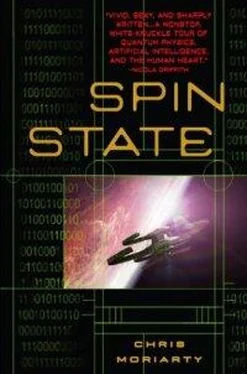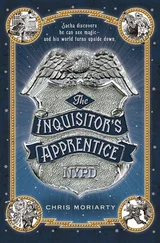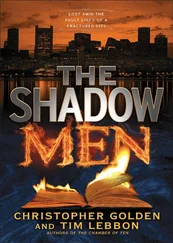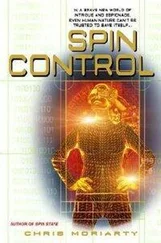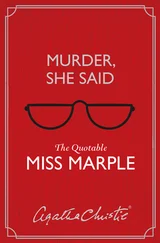Li looked at him suspiciously. “How do you know about this?”
“It happens to be a matter of personal interest to me. And to certain of my colleagues.”
“ALEF, in other words.”
“Mmm. The Secretariat seems to be under the impression that we have somehow, er, liberated AMC’s field AI.”
“Have you?”
“Of course not. Really.” He rolled his eyes. “You’ve been downloading too many cheap interactives.”
“Okay,” Li said. “So you didn’t have anything to do with it. How far do you trust the other ALEF AIs?”
He looked at her condescendingly. “That question displays an almost human obtuseness. It’s not a matter of trust. It’s a matter of information-sharing protocols. Besides, what would be the point? Field AIs are zombies. Have you seen the feedback loops they program into them? They’re barely even sentient.”
“Then who did it?”
“Why jump to conclusions? Maybe the field AI is controlling himself.”
“You think it’s gone rogue?”
“Oh, how I loathe that word,” Cohen said to the ceiling. “It makes it sound as if any AI who tries to get control of his own code is the equivalent of a rampaging elephant.”
Li forged ahead. “I thought field AIs couldn’t go ro—uh, rewrite their own code.”
“Well, they’re certainly not supposed to be able to.” He grinned. “But then neither was I, according to some so-called experts. Tell me, what fool’s errand does Nguyen have you running on Compson’s? What’s the cover story? And how much has she told you about what’s really going on?”
“I don’t think—”
“My dear girl. You’re the one sitting in my house asking me questions.” He threw back his head, closed his eyes, and blew an exquisite smoke ring. “If you can’t share, I really don’t see why I should play with you at all.”
She told him. He slouched against the sofa’s high back and listened, the slow rise and fall of Roland’s stomach the only sign of life about him. When she was done, he gazed at the ceiling and blew several more smoke rings before answering.
“Three things,” he said finally. “One, Helen’s told you nothing. Nothing of substance, anyway. Two, this is cleanup detail, not a real investigation. Three, she’s worried cross-eyed about keeping the lid on whatever Sharifi was doing, or she wouldn’t have picked you for the job.”
“There wasn’t any picking about it,” Li lied. “I was the closest person.”
“Mmm. Convenient that you were so close, isn’t it?”
“I guess.”
Cohen snorted daintily. “Don’t give me the simple soldier act. I know you better. Nguyen put your court-martial, or whatever they’re calling it, on ice in order to send you on a private fishing trip. You’re in bad trouble, and she knows you well enough to know you’ll do whatever it takes to climb out of it. Do the math, Catherine. You step out of line, and you can bet your Fromherz nodes it won’t be ten minutes before she’s politely reminding you that she holds your career in her hands.”
Li shifted, suddenly uncomfortable on the plush sofa. “That’s a suspicious-minded way of putting it.”
“Which is precisely why I know you’ve already thought of it.” He grinned. “Besides, I have great respect for Helen. She’s admirably ruthless, and it’s always edifying to watch a master at work. By the way, I wouldn’t recommend telling her you’ve been to see me. She’s a little sour on me just at the moment.”
Li resisted the urge to point out that Nguyen might have good reasons for being sour on him. Instead she said, “What can you tell me about Hannah Sharifi?”
Cohen smiled. “What do you want to know?”
“Everything. Did you know her personally?”
The smile broadened.
“Christ, Cohen, is there anyone you haven’t slept with?”
He sighed ostentatiously. “Oh, spare me your puritanical miner’s daughter morality. At least I’m still speaking to all my exes. Unlike some people I could name.”
“I’m still speaking to you, aren’t I?” Li said, deadpan.
They looked at each other—really looked—for the first time since she’d arrived.
Cohen looked away first and leaned forward to tap the ash off his cigarette. “I don’t think you get the credit for that.”
Li stood up and walked around the room.
Pictures of long-forgotten eighteenth-century contessas and marquises hung on the grass-papered walls. The Jaquet-Droz automaton on the card table could write messages of up to forty strokes in any alphabet, nod its head, and move its buckram-stuffed chest up and down under its frock coat in a gear-and-pulley imitation of real breathing. The bookshelves held snapshots of scientists clowning for the camera in front of ivy-covered buildings, including a first-generation print of the famous shot of the original Hyacinthe Cohen at some historic AI conference before the Evacuation. Beside it were newer photos of the Cohen she knew—or rather photos of handsome unfamiliar faces wearing his sly smile. At parties. Playing with his dogs. Talking to the Israeli prime minister. Sitting on the beach outside Tel Aviv. That one must be recent, she realized; there was Roland’s face eyeing her from inside the picture frame.
And there were novels, of course. Cohen and his novels. Stendhal. Balzac. The Brontës. Sometimes Li thought he knew more about book people than real people.
She pulled a book from the shelf. It crackled in her hand and breathed out a tickly but pleasant-smelling cloud of leather, glue, and paper particles. She let it fall open at random:
“Are you anything akin to me, do you think, Jane?”
I could risk no sort of answer by this time: my heart was full.
“Because,” he said, “I sometimes have a queer feeling with regard to you—especially when you are near me, as now; it is as if I had a string somewhere under my left ribs, tightly and inextricably knotted to a similar string situated in the corresponding quarter of your little frame. And if that boisterous channel, and two hundred miles or so of land come broad between us, I am afraid that cord of communion will be snapt; and then I’ve a nervous notion I should take to bleeding inwardly. As for you —you’d forget me.”
“Why do you keep this rubbish?” she asked Cohen, her nose still in the book. Her back was to him, but she couldn’t quite hide the smile in her voice. “It’s toxic. I’ve ingested eighteen kinds of mold just from opening the thing.”
“I’m obsessed by obsolete and troublesome technologies. Why else would I waste so much time on you?”
Li laughed and shut the book. “Speaking of obsolete technology, you knew Sharifi came out of the XenoGen birthlabs, didn’t you?”
“Oh yes. Same as you.”
Li stiffened, still not looking at him. “Same as my grandmother.”
“Of course.”
“Did Sharifi ever talk to you about that?”
“Not as such. But she talked about Compson’s World. She lived there until she was eight. Some orphanage in Helena. With nuns.”
“Sounds fun.”
“What I remember being most impressed by was why she ended up in the orphanage.”
“Oh?”
“She was blind.”
Li turned to stare at him.
“She was born blind. Something in the ocular nerve. Easily correctable. Her adoptive parents fixed it. But the birthlab made a cost-benefit analysis and decided to cull her instead of paying for the operation.”
“Merciful Christ,” Li whispered.
“I doubt mercy had much to do with it. What’s the saying? Pray to the Virgin; God took one look at Compson’s World and went back to Earth? Anyway, according to Hannah the orphanage she grew up in was full of constructs the labs dumped on the streets because of minor defects. Brings a whole new meaning to the externalization of operating costs. ‘The cheapest technology is human technology,’ she liked to say. And she was right, really. The Ring, the UN, interstellar commerce. It’s all running on the blood and sweat of a few hundred thousand miners who spend the first half of their lives underground and the last half dying of black-lung.” He laughed. “It’s positively Victorian. Or maybe it’s just human.”
Читать дальше
